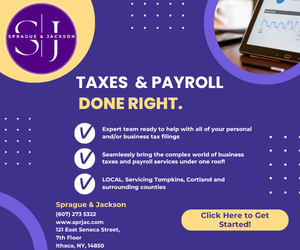(607NewsNow) — When it comes to managing your taxes, proper planning is one of the most powerful tools at your disposal. Whether you’re preparing for retirement, selling your home, or managing other major life events, being proactive about your tax strategy can help you avoid unnecessary penalties and maximize your financial outcomes.
Why It’s Important to Talk with a Tax Professional
A key part of any financial plan is knowing when to ask for help. Scheduling a conversation with a tax professional early on is a smart move. Whether you’re thinking about retiring in the next few years or considering selling your home, a tax expert can walk you through the nuances and help you avoid costly mistakes.
For example, did you know that the way you sell your home could have major tax implications? If you’ve lived in your home for two of the last five years, you might qualify for the home sale exclusion, which allows you to exclude up to $250,000 of profit from the sale ($500,000 for married couples) from your taxable income. But, the rules around this can be tricky, especially if you’ve used your home as a rental property or if it’s been a long time since you bought it.
By speaking with a tax professional, you can clarify which tax benefits you qualify for and what steps to take before selling your property.
Planning for Retirement
Retirement is another major life change that requires careful tax planning. Whether you’re nearing retirement or just starting to think about it, you’ll want to consider how your income will change and what steps you can take to minimize taxes in retirement.
Contributing to tax-advantaged retirement accounts, like IRAs and 401(k)s, is a good place to start. If you haven’t maxed out your contributions for the year, doing so could lower your current tax bill while setting you up for a more comfortable retirement. A tax professional can also help you decide whether a traditional or Roth IRA is best for your long-term goals, as each has different tax implications both now and in the future.
Estimated Tax Payments: Don’t Get Caught Off Guard
If you’re self-employed, own rental properties, or have investment income, you’ll likely need to make estimated tax payments throughout the year. These quarterly payments help you avoid underpayment penalties when tax season rolls around. But calculating how much to pay can be tricky, especially if your income fluctuates.
Working with a tax advisor can help you figure out exactly how much you should set aside for these payments. They’ll take into account not just your income but also deductions, credits, and other factors that might lower your overall tax liability. Paying attention to estimated taxes now can save you from an unexpected bill—and penalties—later.
Planning Ahead: The Best Strategy for Big Financial Moves
Whether you’re selling a home, preparing for retirement, or just navigating the complexities of estimated tax payments, proactive planning is essential. At Sprague & Jackson, we specialize in helping our clients develop long-term tax strategies that grow with them. From reducing tax liabilities to preparing for life’s major milestones, we’re here to ensure you’re on the right path.
For a more personalized tax consultation, reach out today to Sprague & Jackson. You can give us a call or visit www.sprjac.com for more information!




